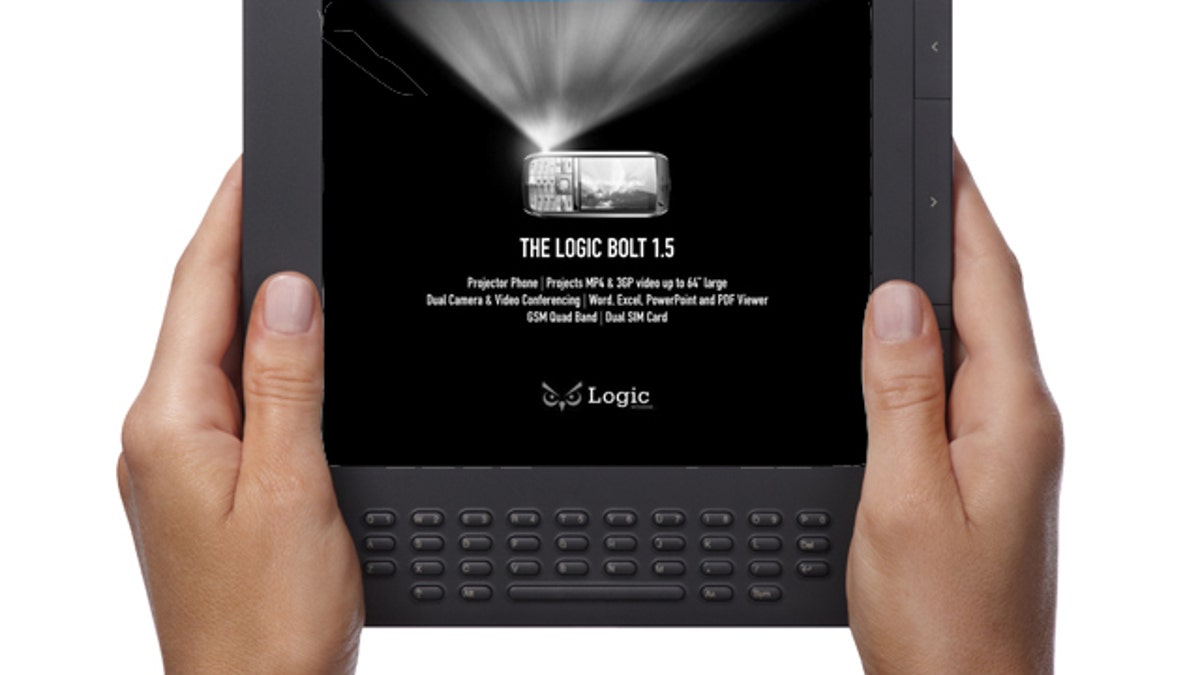
An illustration of an Amazon Kindle DX 2 e-book reader displaying a book -- but first, a message from the sponsor. One company believes advertisements are the way to wring profits out of the electronic book market. (Amazon.com / Wowio)
Barnes & Noble may kick off a fresh price war today for digital book readers. But the real news in digital publishing is a novel approach to the e-books themselves: Free books -- with advertising.
E-books and readers already look to be the holiday season's sleeper hit. Amazon announced that sales of its Kindle this month have already surpassed sales of the devices for the entire fourth quarter last year. And the company said that it will soon allow you to lend electronic versions of books for 14 days, a feature already offered on Barnes & Noble's Nook. (True friendship means always getting your loaned e-book back.)
Handheld electronic readers are clearly going mainstream. Wal-Mart just started selling Barnes & Noble's Nook this week, starting at $148. Best Buy sells both the Nook and the Kindle. Radio Shack offers Sony e-Readers, and Target recently starting selling Apple's iPad.
So it's not surprising that more independent online e-book stores and publishers are looking to get in on the action. Stores other than Amazon and Barnes & Noble do exist, after all, such as BooksOnBoard and the Diesel e-book store -- no connection to the jeans. Most of these independent operators offer e-books in a variety of formats that can be downloaded and read on anything from a smartphone to an e-book reader.
But only one independent seller is offering free books with ads: Wowio.
The basic idea is to offer publishers another way to reach readers and to give readers the chance to try more books -- books that perhaps they wouldn't normally peruse if they had to pay more for them. Initially, Wowio specialized in offering digital versions of comic books and graphic novels, usually formatted as Adobe PDFs. So it was a natural step for the company to offer graphic ads that are inserted in e-books.
The ads themselves aren't intrusive: There are no annoying highlighted links in the text, nor are there irritating animations or takeovers to interrupt the reading experience. The advertisements are simply pages added to a book, typically up front: Notices for movie site Fandango and auction site iTaggit appeared in the copy of H.G. Wells' The War of the Worlds that I read. It's much like the advertising you'd see in a magazine, except that if you want more information or are enticed by a promotion, all you have to do is click to visit the advertiser's site.
"We think we're creating a broader audience for some of these titles," Wowio's CEO Brian Altounian told me. "I think folks are going to download more books because they're saving the costs" of having to drive to the store or pay more for them.
So far, Wowio just sells titles in PDF format, but this week it announced a major step forward by signing a deal with massive distributor Ingram, which will give the online store access to more than 50,000 popular books on November 1. Ingram has many bestsellers, such as The Girl with the Dragon Tattoo by Stieg Larsson and Legacy by Danielle Steel.
Ingram titles will be in the ePub format, which gives the publisher some control over how many devices the books can be copied to; it's also the format supported by Barnes & Noble's Nook and Sony's e-Reader. However, these e-books will not include advertising, with prices for individual titles yet to be determined.
"We're not trying to force publishers into any sort of pricing paradigm," said Altounian, referring to Amazon's and Apple's contract tussles with publishers. Meanwhile, Amazon is also planning to offer a free iPad app for its books. So Wowio is keeping readers' and publishers' options open.
One the other hand, Wowio is clearly betting that ad-supported e-books will be the future. The company was just granted what the patent office calls a "notice of allowance" for delivering advertisements in e-books. According to Altounian, the company expects to finally receive a very broad patent next month.
If he's right about how readers and publishers react to the format, the company could stand to make a lot of money from licensing the patent. And we could stand to save a lot of money on our future e-book purchases.








































